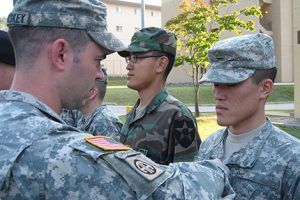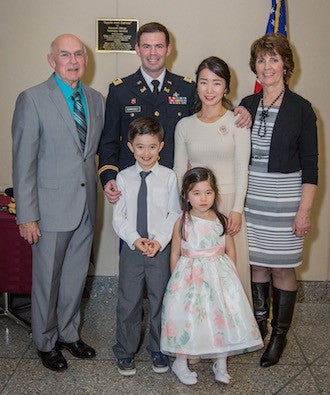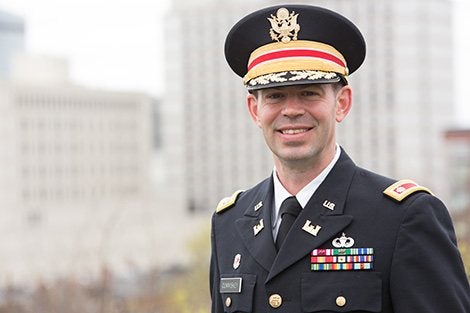For Kevin Cummiskey, PhD ’18, the altruistic ideal that guides him in his military career is also what led him to the field of public health—the opportunity to serve the greater good
May 17, 2018 – Public service is Kevin Cummiskey’s true north.
“The notion of public service and selfless service—that we’re here to serve our society—is at the very core of the military profession,” said Cummiskey, who’s set to earn a PhD in biostatistics from the Harvard Chan School this month. “That same feeling is present here at the School of Public Health.”
An Army lieutenant colonel, Cummiskey has served in Korea and Iraq and has taught statistics at West Point, where he graduated with a bachelor’s in mathematical sciences in 2000. Now, armed with his doctoral degree from Harvard Chan School, he’ll return to West Point for a three-year stint as an assistant professor, overseeing introductory courses in probability and statistics and supervising undergraduate research projects.
Military pursuits
In high school, when it was time to start looking at colleges, Cummiskey decided to tour West Point. He was so impressed with the military academy that he barely considered other schools. Arriving on campus as a plebe (freshman), he was further impressed by how strongly faculty and students were committed to each other and by the high-quality leadership development opportunities.
“Of course it was challenging,” he said. “It’s supposed to be challenging—academically, emotionally, physically. But at the same time there was a support structure built in to make people successful.”
After leaving West Point, Cummiskey was commissioned as a Second Lieutenant in the Corps of Engineers. At Fort Bragg, North Carolina, he served as a platoon leader responsible for about 30 paratroopers and later as an executive officer who was second in command of a 150-soldier company in the Army’s 82nd Airborne Division, an elite unit specializing in parachute assault operations. Cummiskey completed 35 parachute jumps in training exercises during this time. In 2003, he deployed to Kuwait prior to the Iraq War and oversaw construction of a basecamp there. During the conflict, he deployed to various locations in Iraq, coordinating the construction of security measures.

After Iraq, Cummiskey served in the Republic of Korea for four years. He began as a company commander in charge of 120 combat engineers in the 2nd Infantry Division, stationed 20 kilometers from the demilitarized zone. He later became the aide to a two-star general, the division commander—a job similar in responsibility to that of a congressional aide.
In 2008 Cummiskey had the opportunity to enroll in a master’s degree program in operations research at the College of William and Mary, after which he spent three years back at West Point teaching an introductory course on probability and statistics—which made him realize that he loved teaching. “Teaching was an amazing experience, far more personally rewarding then I could have ever imagined,” he said. “And to be able to do so in the context of developing and influencing future military leaders was very gratifying.”
He spent another two years in Korea as an operations research and systems analyst, then took another opportunity offered by the Army—to earn a PhD and then return to West Point for a second teaching stint. He decided to study biostatistics because he’d had colleagues with that degree and had been impressed with work they’d done on soldiers’ and veterans’ health, and envisioned himself doing the same.
Camaraderie, collaboration
Cummiskey considered both Yale and Brown for biostatistics but decided to come to Harvard Chan School because of its reputation and the scope of its research. It was intimidating at first, he said. In the biostatistics department’s summer review program, his fellow PhD students were articulate and charismatic. The instructor for the course was another student who “was obviously light years ahead of me in terms of mathematical understanding of concepts,” he said. “I remember thinking: ‘There’s no way I’m going to survive three years here.’ ”
It got better. “The camaraderie amongst my PhD cohort was great,” he said. “We all really supported each other, and I think the department does a lot to foster the connections between students. That feeling of intimidation quickly wore off thanks to these relationships.”
Cummiskey also made sure, early on, to learn about the air pollution research of Corwin Zigler, assistant professor of biostatistics, at the recommendation of a fellow Army officer who’d worked with him several years earlier when she was a Harvard Chan student. “I learned that Cory was trying to use air pollution research and make it applicable to government policy decision-making,” Cummiskey said. “I found that really compelling, because I would also like to conduct research, for the military, that has that kind of translational impact.”
Working on his dissertation with Zigler and several colleagues, Cummiskey looked at the association between long-term exposure to emissions from coal-fired power plants and ischemic heart disease hospitalizations among Medicare recipients across the U.S. and found higher rates of the disease in several regions. The research relied on an air quality model developed at the University of Washington that maps how emissions travel from each individual power plant in the U.S. to population centers all over the country.
Cummiskey has submitted his dissertation research to a journal for potential publication. Moving forward, he plans to continue collaborating with Zigler on air pollution studies. And when he finishes his three years of teaching at West Point, he will likely take on a role leading large research projects for the Army. He thinks there are many ways he can use his biostatistics training, including investigating risk factors for soldiers’ and veterans’ health, the effectiveness of different types of equipment on injury prevention, and treatment options for combat-related injuries.
Support base
Cummiskey had high praise for Zigler. “He is a phenomenal researcher and mentor,” he said. “He has been tremendously committed to my development as a researcher and scientist. My interactions with him have been the defining experience of the last three years.”
Zigler was equally impressed with Cummiskey. “Kevin came into the program with a unique background relative to most of our students, and his past experiences really led him to stand out in the best of ways,” he said. “He has a refreshing combination of intelligence, initiative, high self-standard, and collegiality that I and all the others in our research group particularly appreciated.”

Cummiskey, who recently turned 40, said he couldn’t have gotten through the program without the support of his wife Bokyeon, whom he met during his first assignment in Korea; his children, nine-year-old Andrew and seven-year-old Ashley; and his parents, Robert and Elizabeth Cummiskey. “You don’t get a chance to do a PhD at my point in life if you don’t have the full support of your family,” he said.
The above statements are those of Kevin Cummiskey and do not represent the official position of the U.S. Department of Defense, the Army, or West Point.
feature photo: Sarah Sholes; additional photos courtesy Kevin Cummiskey
